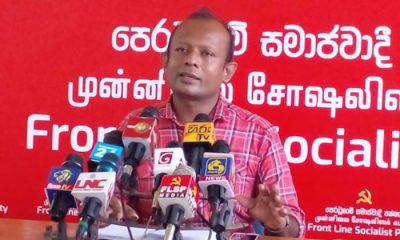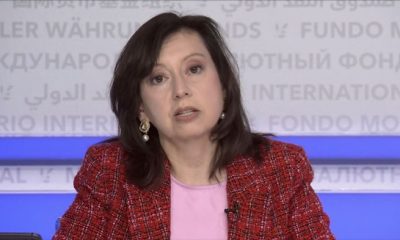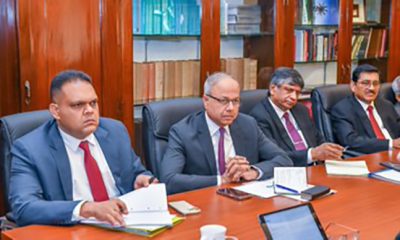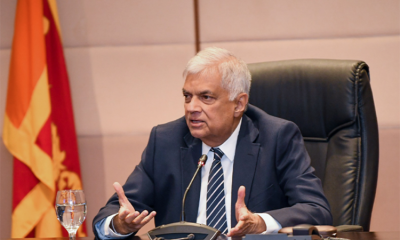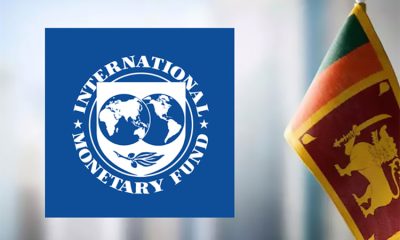News
IMF says addressing corruption key aspect of its programme for SL

CPC, CEB need to recover costs until end of Fund’s loan package
By Rathindra Kuruwita
The Ceylon Petroleum Corporation (CPC) and Ceylon Electricity Board (CEB) had to recover costs until the end of the IMF programme, Sarwat Jahan, IMF Resident Representative in Sri Lanka, told a press conference in Colombo yesterday.
The IMF also wanted the government to restructure the balance sheets of a number of other State Owned Enterprises (SOEs), Jahan said, adding that the IMF was concerned about the impact of the programme on the most vulnerable people and it had asked the government to have social security floors to ensure that their welfare is met.
“The amount of money that can be allocated depends on the fiscal space it has. As it is 0.6 percent of the GDP can be allocated for social security. This can be increased when the economic situation improves,” she said.
IMF Director of Asia and Pacific Department Krishna Srinivasan said that Sri Lanka would be subjected to a country diagnostic exercise and that addressing corruption was a key aspect of this programme. “Sri Lanka came to us for this program. This shows that they have recognized that corruption is a serious issue. Sri Lanka has carried a number of prior actions before the agreement was signed with the IMF and that shows Sri Lanka is committed to the reforms process,” he said.
Given below is the opening remarks by Krishna Srinivasan.
“I am here in Colombo—my first visit to Sri Lanka—to further strengthen the IMF’s engagement with a broad spectrum of stakeholders in the country. In addition to meeting with the President and top leadership of the country, I have been able to engage with members of the opposition, civil society organizations, trade unions, think tanks, and other stakeholders. An IMF staff team, led by Peter Breuer, is also currently in Sri Lanka and will be here until May 23 for regular consultations ahead of the first review mission later this year. The team will communicate further with you at the end of its visit.
“To put things in perspective, before I talk about Sri Lanka, let me offer a few thoughts on the global and regional outlook.
“2023 looks to be a challenging year for the global economy. Global growth is expected to decelerate and bottom out in 2023, as rising interest rates and Russia’s war in Ukraine weigh on activity. Global inflation is easing but remains stubbornly high. And banking strains in the U.S. and Europe have injected greater uncertainty into an already complex landscape.
Against this uncertain global backdrop, Asia-Pacific remains a dynamic region. Despite weakening external demand and monetary tightening across major economies around the world, domestic demand has so far remained strong. Growth in Asia and the Pacific is projected to increase this year to 4.6 percent, up from 3.8 percent in 2022. As a result, the region would contribute around 70 percent to global growth. Asia’s dynamism will be driven primarily by the recovery in China and resilient growth in India, while growth in the rest of Asia is expected to bottom out in 2023, in line with other regions.
“This dynamic outlook, however, does not imply that policymakers in the region can afford to be complacent. Headline inflation has been easing, but remains above targets in most countries, while core inflation has proven to be sticky. Although spillovers from turmoil in the European and US banking sectors have been limited thus far, vulnerabilities to global financial tightening and volatile market conditions, especially in the corporate and household sectors, remain elevated. Growth in the region is expected to fall to 3.9 percent five years out, the lowest medium-term forecast in recent history, reflecting a combination of factors, including an aging population, falling productivity, and scarring from the pandemic.
Risks to the outlook are to the downside, owing to the possibility of stickier global and regional price pressures, the disconnect between market views regarding the monetary policy path in advanced economies and what is being communicated by their central banks, the possibility of additional turmoil in global financial markets, adverse spillovers to the region from China’s medium-term growth slowdown, and deeper geo-economic fragmentation.
“What does this challenging global environment mean for Sri Lanka?
Sri Lanka, as you know, has been facing a severe crisis because of past policy missteps and back-to-back economic shocks. We have been deeply concerned about the impact of the crisis on the Sri Lankan people, particularly the poor and vulnerable groups, and about the economic costs of the delay in the country’s access to external financing.
“On March 20, the IMF Executive Board approved a 48-month Extended Fund Facility of about 3 billion U.S. dollars to support Sri Lanka’s economic policies and reforms. This marked an important step towards the resolution of the crisis. Sri Lanka immediately received an initial disbursement of about $330 million from the EFF arrangement, which is expected to catalyze new external financial including from the Asian Development Bank and the World Bank. Given the weak external environment and domestic policy tightening, aimed at restoring macroeconomic stability, the economy is expected to contract by 3 percent in 2023, before registering a modest growth of 1.5 percent in 2024. Prospects hinge quite critically on the implementation of the economic reform program.
“As you know well by now, the reform program supported under the EFF arrangement is built on strong policy measures and prioritizes five key pillars.
“First, an ambitious revenue-based fiscal consolidation,which is accompanied by stronger social safety nets, fiscal institutional reforms, and cost recovery-based energy pricing to ensure the state’s ability to support all its essential expenditures.
“Second, restoration of public debt sustainability including through a debt restructuring to ensure stable financing of the government’s operations.
Third, a multi-pronged strategy to restore price stability and rebuild reserves under greater exchange rate flexibility to alleviate the burden of inflation, particularly on the poor, to foster an environment of investment and growth, and to ensure Sri Lanka’s ability to purchase essential goods from abroad.
“Fourth, policies to safeguard financial sector stability, to ensure that the financial sector can play its key role in supporting economic growth.
“And fifth, structural reforms to address corruption vulnerabilities and enhance growth. Anti-corruption and governance reforms are imperative to ensure the hard-won gains from the reforms benefit the Sri Lankan people. Sri Lanka is the first country in Asia that has undergone the IMF governance diagnostic exercise. The IMF governance diagnostic report is expected to be published by September this year—the mission visited Colombo in March and engaged closely with stakeholders and civil society organizations on this critical reform area. We look forward to further discussion with them.
“Commendably, Sri Lanka has already started implementing many of the challenging policy actions in these five areas. It is now essential to continue the reform momentum under strong ownership by the authorities and the Sri Lankan people, more broadly.
“Economic impact of the reforms on the poor and vulnerable needs to be mitigated with appropriate measures. In this regard, we welcome the authorities’ firm commitment to strengthen social safety nets, including through a minimum spending floor, well-targeted spending through the new social registry and establishment of objective eligibility criteria.
“Let me conclude by saying that the IMF supported program is an opportunity for all Sri Lankans to come together to work through this crisis to restore economic stability and put the country on a sustainable growth path. The key is implementation. The IMF is here to help you along the way.”
News
US sports envoys to Lanka to champion youth development

The U.S. Embassy in Colombo welcomed the U.S. Sports Envoys to Sri Lanka, former National Basketball Association (NBA) and Women’s National Basketball Association (WNBA) players Stephen Howard and Astou Ndiaye, from June 8 through 14.
The Public Diplomacy section of the U.S. Embassy said that it would launch a weeklong basketball program intended to harness the unifying power of sports, made possible through collaboration with Foundation of Goodness and IImpact Hoop Lab.
While in Sri Lanka, Howard and Ndiaye, both retired professional basketball players, will conduct a weeklong program, Hoops for Hope: Bridging Borders through Basketball. The Sports Envoys will lead basketball clinics and exhibition matches and engage in leadership sessions in Colombo and Southern Province for youth aged 14-18 from Northern, Uva, Eastern and Western Provinces, offering skills and leadership training both on and off the court. The U.S. Envoys will also share their expertise with the Sri Lanka Basketball Federation, national coaches, and players, furthering the development of basketball in the country. Beyond the clinics, they will collaborate with Sri Lankan schoolchildren to take part in a community service project in the Colombo area.
“We are so proud to welcome Stephen and Astou as our Sports Envoys to Sri Lanka, to build on the strong people-to-people connections between the United States and Sri Lanka,” said U.S. Ambassador Julie Chung. “The lessons that will be shared by our Sports Envoys – communication, teamwork, resilience, inclusion, and conflict resolution – are essential for leadership development, community building, equality, and peace. The U.S. Sports Envoy program is a testament to our belief that sports can be a powerful tool in promoting peace and unity.”
News
Rahuman questions sudden cancellation of leave of CEB employees

SJB Colombo District MP Mujibur Rahuman in parliament demanded to know from the government the reasons for CEB suspending the leave of all its employees until further notice from Thursday.
MP Rahuman said that the CEB has got an acting General Manager anew and the latter yesterday morning issued a circular suspending leave of all CEB employees with immediate effect until further notice.
“We demand that Minister Kanchana Wijesekera should explain this to the House. This circular was issued while this debate on the new Electricity Amendment Bill was pending. There are many who oppose this Bill. The Minister must tell parliament the reason for the urge to cancel the leave of CEB employees,” the MP said.However, Speaker Mahinda Yapa Abeywardena prevented Minister Wijesekera responding to the query and said that the matter raised by MP Rahuman was not relevant.
News
CIPM successfully concludes 8th Annual Symposium

The Chartered Institute of Personnel Management (CIPM) successfully concluded the 8th Annual CIPM Symposium, which took place on 31st May 2024. Themed “Nurturing the Human Element—Redefining HRM in a Rapidly Changing World,” the symposium underscored the pivotal role of human resource management (HRM) in today’s dynamic global landscape. Since its inception in 1959, CIPM has been dedicated to advancing the HR profession through education, professional development, and advocacy, solidifying its position as Sri Lanka’s leading professional body for HRM.
Ken Vijayakumar, the President of the CIPM, graced the occasion as the chief guest. The symposium commenced with the welcome address by the Chairperson, Prof. Arosha Adikaram, followed by the Web Launch of the Symposium Proceedings and Abstract Book by the CIPM President. The event featured distinguished addresses, including a speech by Chief Guest Ken Vijayakumar, President of CIPM, and an address by Guest of Honor Shakthi Ranatunga, Chief Operating Officer of MAS Holdings Pvt. Ltd., Sri Lanka.
The symposium also featured an inspiring keynote address by Prof. Mario Fernando, Professor of Management and Director of the Centre for Cross Cultural Management (CCCM) at the University of Wollongong, Australia.
Vote of Thanks of the inauguration session was delivered by Dr. Dillanjani Weeratunga, Symposium Co-chair.
The symposium served as a comprehensive platform for researchers to present their findings across a wide range of critical topics in HRM. These included Cultural Diversity and Inclusion, Talent Development and Retention, Ethical Leadership and Corporate Social Responsibility, Adapting to Technological Advancements, Mental Health and Well-being at Work, Global Workforce Challenges, Employee Empowerment, and Reskilling and Upskilling.
The plenary session was led by Prof. Wasantha Rajapakse. Certificates were awarded to the best paper presenters during the valedictory session, followed by a vote of thanks delivered by Kamani Perera, Manager of Research and Development.
The annual symposium of CIPM was a truly inclusive event, attracting a diverse audience that spanned undergraduates, graduates, working professionals, research scholars and lecturers. This widespread interest highlights the symposium’s significance in the field of HRM, offering a unique opportunity for everyone to network and learn from scholarly brains.The CIPM International Research Symposium was sponsored by Hambantota International Port, Sri Lanka Institute of Information Technology (SLIIT), E B Creasy & Co. PLC, and Print Xcel Company.


